GREAT DEPRESSION IN THE USA DONE BY ALEXANDRA


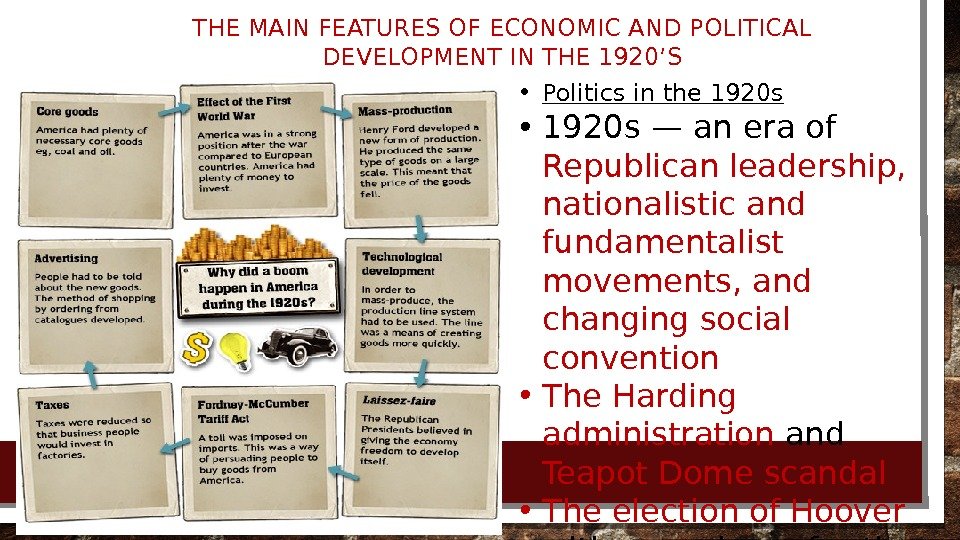
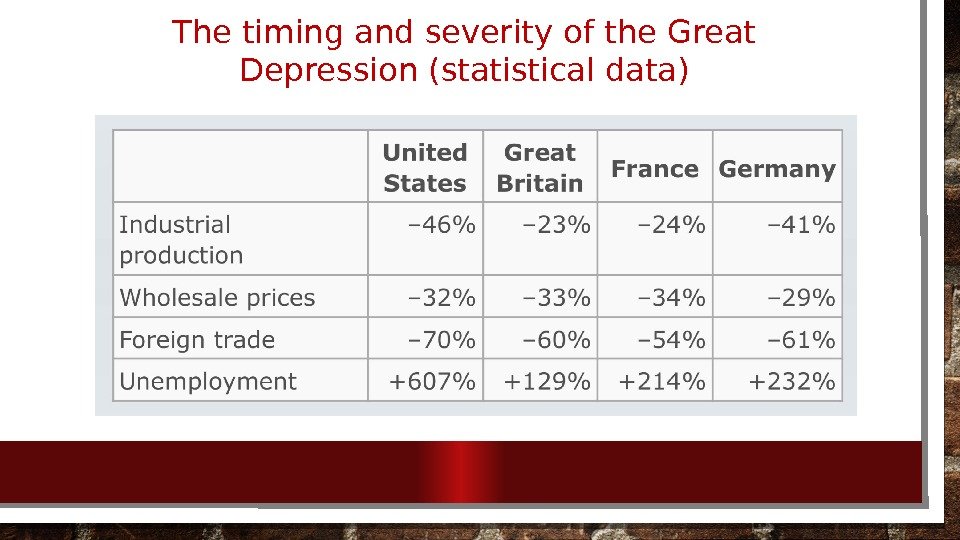
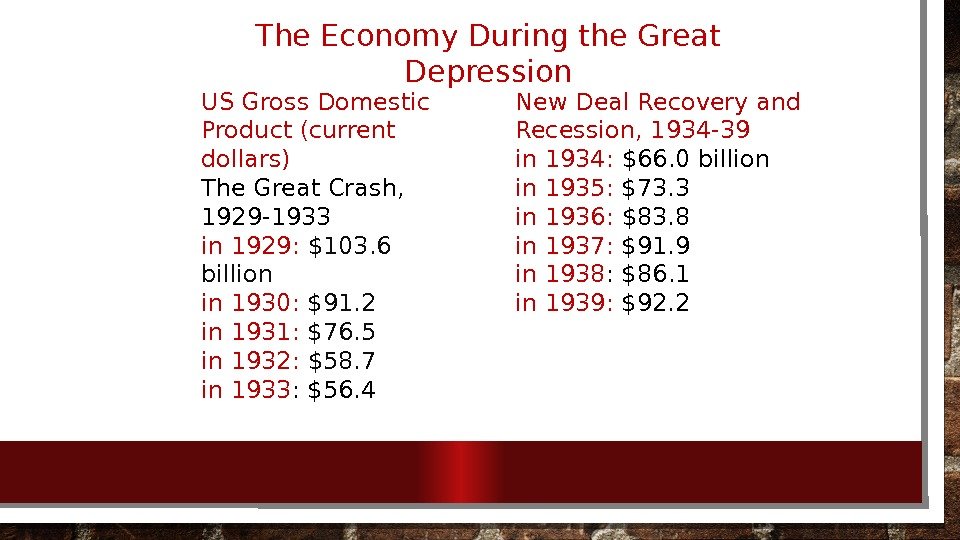
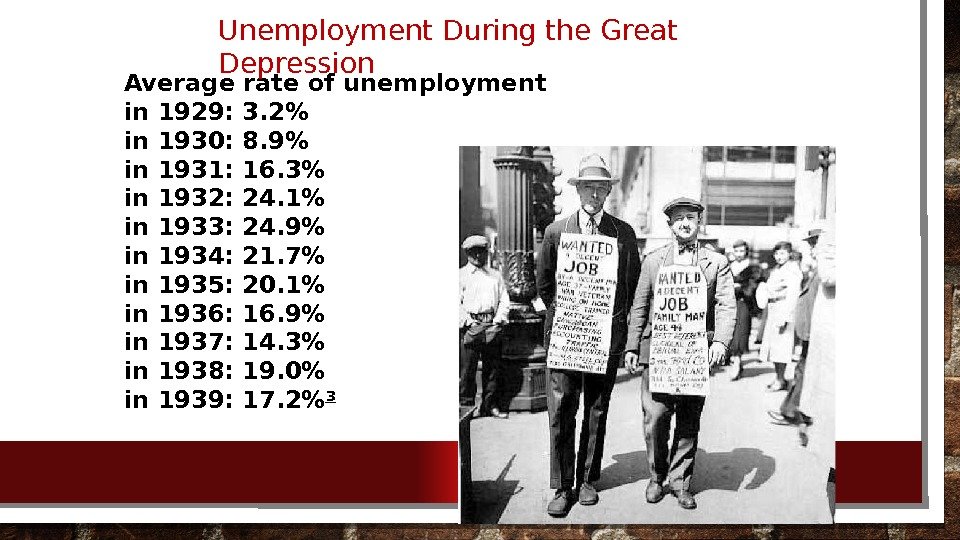
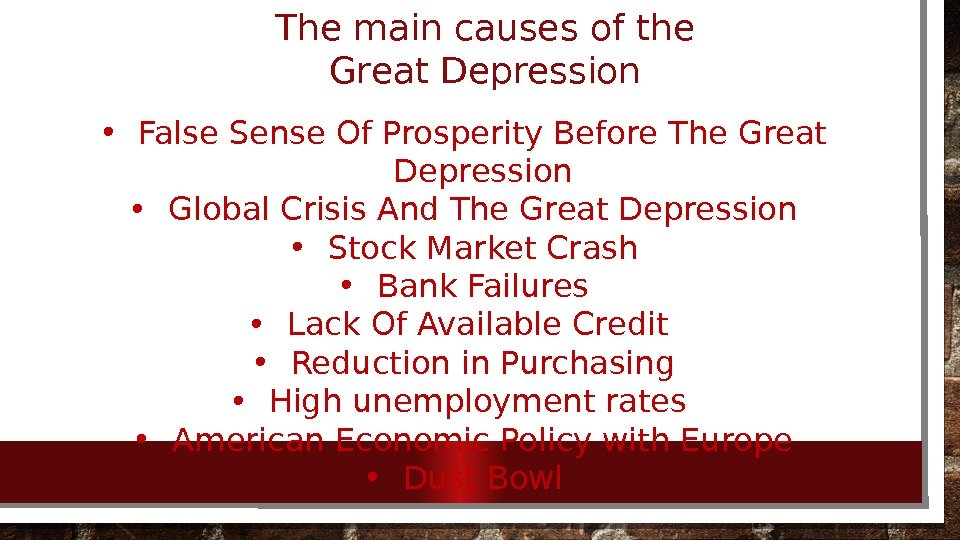
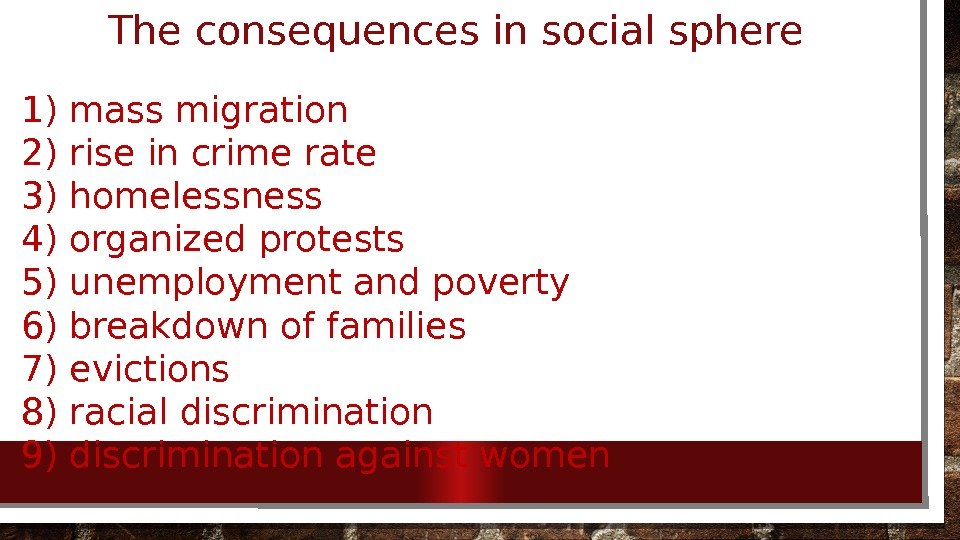
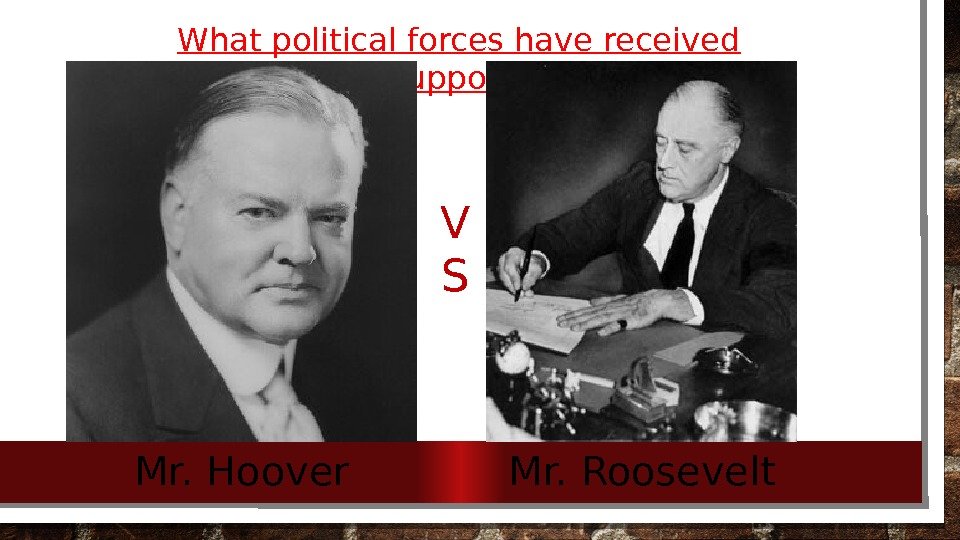
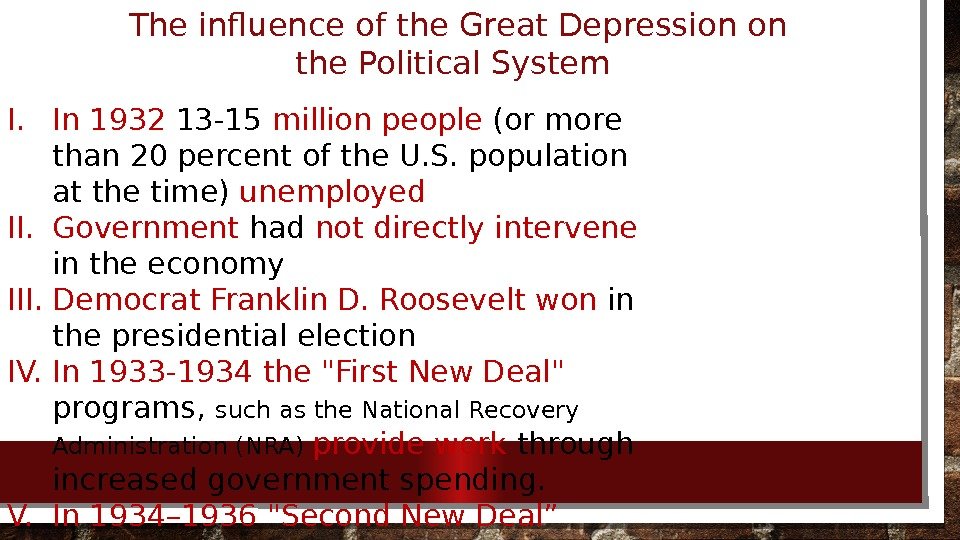
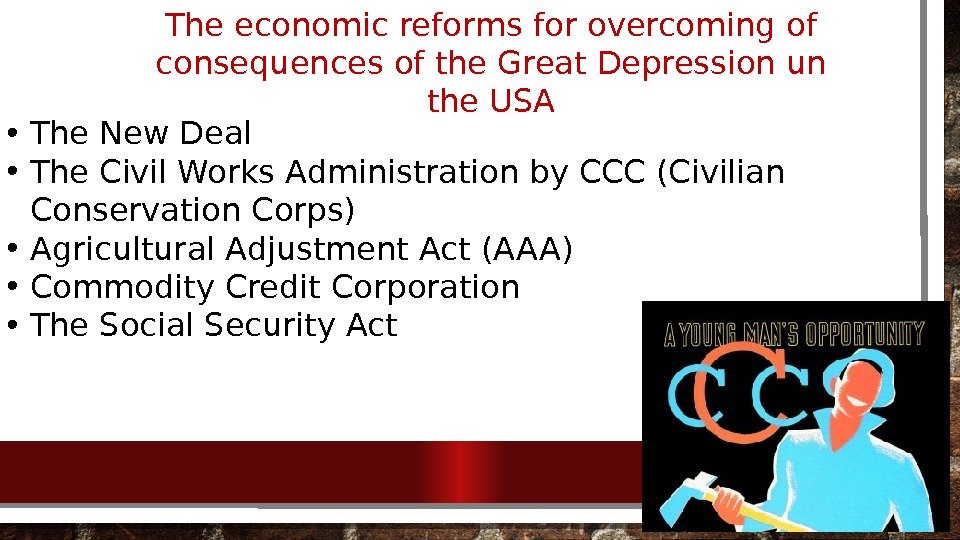
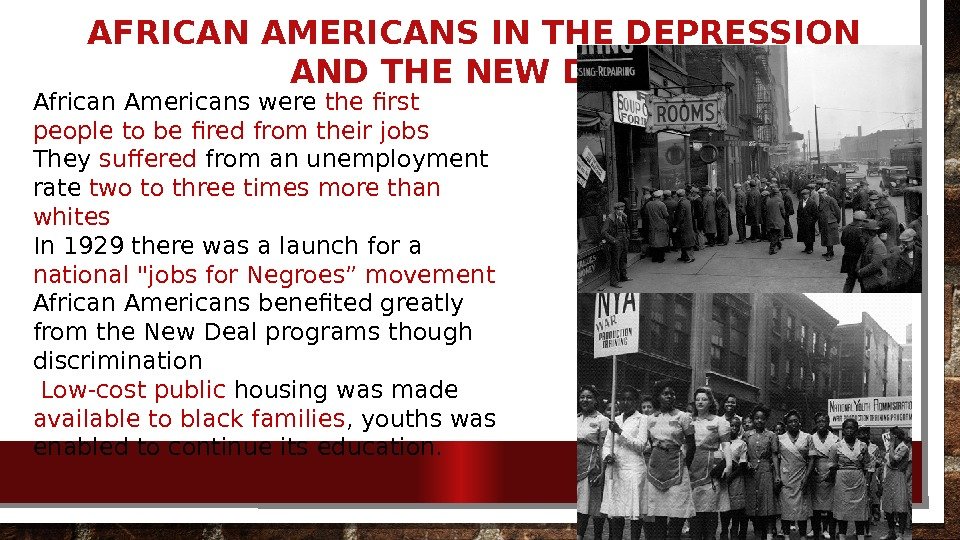
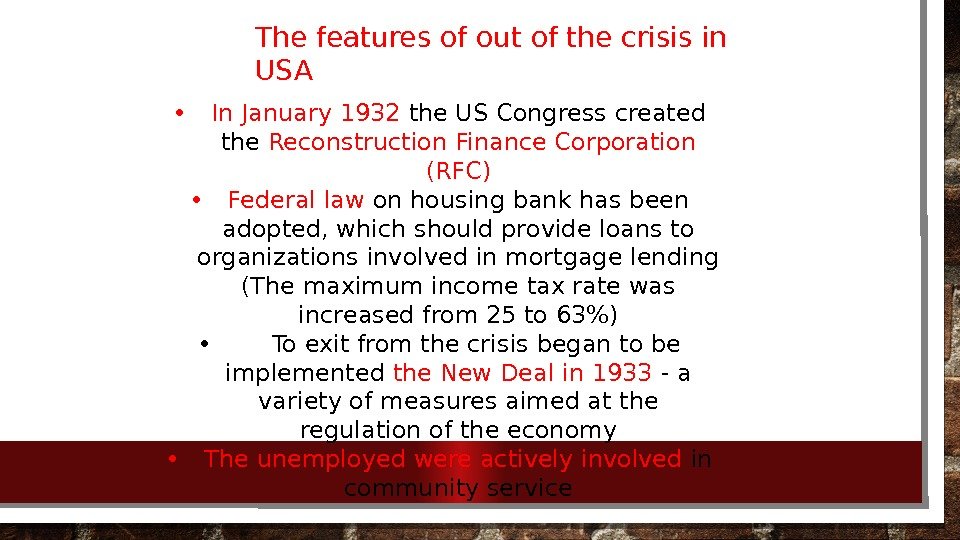
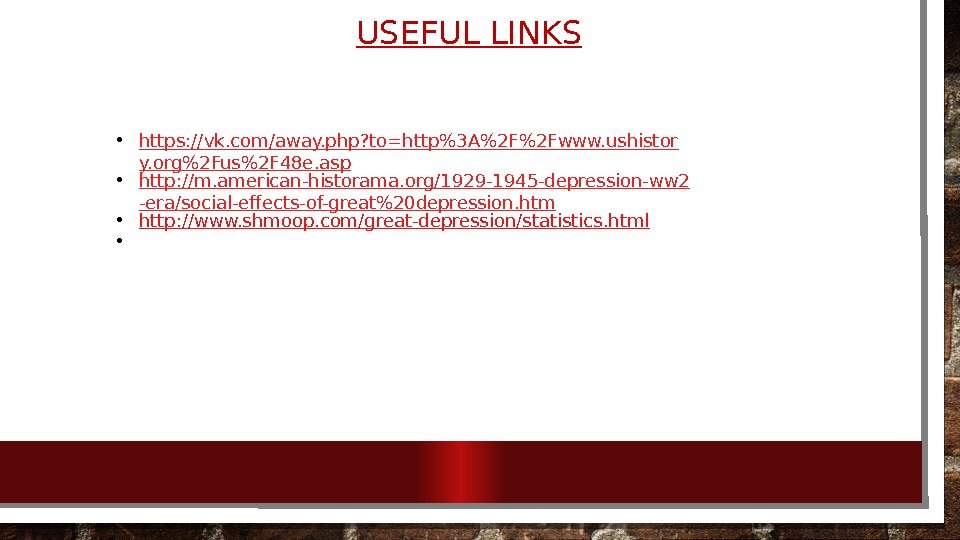

great_depression_in_the_usa.pptx
- Размер: 3.7 Мб
- Автор:
- Количество слайдов: 14
Описание презентации GREAT DEPRESSION IN THE USA DONE BY ALEXANDRA по слайдам
 GREAT DEPRESSION IN THE USA DONE BY ALEXANDRA IVANOVA, OLGA BARABANOVA, ANGELINA IVANOVA, VICTORIA YANHIS, DARIA SIVENKOVA, BOGDAN SHEPEL’SKY, ANASTASIA BESTSENKO, OLGA FOKINA AND KRISTINA TROSHIN
GREAT DEPRESSION IN THE USA DONE BY ALEXANDRA IVANOVA, OLGA BARABANOVA, ANGELINA IVANOVA, VICTORIA YANHIS, DARIA SIVENKOVA, BOGDAN SHEPEL’SKY, ANASTASIA BESTSENKO, OLGA FOKINA AND KRISTINA TROSHIN
 THE MAIN FEATURES OF ECONOMIC AND POLITICAL DEVELOPMENT IN THE 1920’S • Politics in the 1920 s • 1920 s — an era of Republican leadership, nationalistic and fundamentalist movements, and changing social convention • The Harding administration and Teapot Dome scandal • The election of Hoover with some hope for the future
THE MAIN FEATURES OF ECONOMIC AND POLITICAL DEVELOPMENT IN THE 1920’S • Politics in the 1920 s • 1920 s — an era of Republican leadership, nationalistic and fundamentalist movements, and changing social convention • The Harding administration and Teapot Dome scandal • The election of Hoover with some hope for the future
 The timing and severity of the Great Depression (statistical data)
The timing and severity of the Great Depression (statistical data)
 The Economy During the Great Depression US Gross Domestic Product (current dollars) The Great Crash, 1929 -1933 in 1929: $103. 6 billion in 1930: $91. 2 in 1931: $76. 5 in 1932: $58. 7 in 1933 : $56. 4 New Deal Recovery and Recession, 1934 -39 in 1934: $66. 0 billion in 1935: $73. 3 in 1936: $83. 8 in 1937: $91. 9 in 1938 : $86. 1 in 1939: $92.
The Economy During the Great Depression US Gross Domestic Product (current dollars) The Great Crash, 1929 -1933 in 1929: $103. 6 billion in 1930: $91. 2 in 1931: $76. 5 in 1932: $58. 7 in 1933 : $56. 4 New Deal Recovery and Recession, 1934 -39 in 1934: $66. 0 billion in 1935: $73. 3 in 1936: $83. 8 in 1937: $91. 9 in 1938 : $86. 1 in 1939: $92.
 Average rate of unemployment in 1929: 3. 2% in 1930: 8. 9% in 1931: 16. 3% in 1932: 24. 1% in 1933: 24. 9% in 1934: 21. 7% in 1935: 20. 1% in 1936: 16. 9% in 1937: 14. 3% in 1938: 19. 0% in 1939: 17. 2% 3 Unemployment During the Great Depression
Average rate of unemployment in 1929: 3. 2% in 1930: 8. 9% in 1931: 16. 3% in 1932: 24. 1% in 1933: 24. 9% in 1934: 21. 7% in 1935: 20. 1% in 1936: 16. 9% in 1937: 14. 3% in 1938: 19. 0% in 1939: 17. 2% 3 Unemployment During the Great Depression
 The main causes of the Great Depression • False Sense Of Prosperity Before The Great Depression • Global Crisis And The Great Depression • Stock Market Crash • Bank Failures • Lack Of Available Credit • Reduction in Purchasing • High unemployment rates • American Economic Policy with Europe • Dust Bowl
The main causes of the Great Depression • False Sense Of Prosperity Before The Great Depression • Global Crisis And The Great Depression • Stock Market Crash • Bank Failures • Lack Of Available Credit • Reduction in Purchasing • High unemployment rates • American Economic Policy with Europe • Dust Bowl
 The consequences in social sphere 1) mass migration 2) rise in crime rate 3) homelessness 4) organized protests 5) unemployment and poverty 6) breakdown of families 7) evictions 8) racial discrimination 9) discrimination against women
The consequences in social sphere 1) mass migration 2) rise in crime rate 3) homelessness 4) organized protests 5) unemployment and poverty 6) breakdown of families 7) evictions 8) racial discrimination 9) discrimination against women
 What political forces have received support? V S Mr. Hoover Mr. Roosevelt
What political forces have received support? V S Mr. Hoover Mr. Roosevelt
 The influence of the Great Depression on the Political System I. In 1932 13 -15 million people (or more than 20 percent of the U. S. population at the time) unemployed II. Government had not directly intervene in the economy III. Democrat. Franklin D. Rooseveltwon in the presidential election IV. In 1933 -1934 the «First New Deal» programs, such as the. National Recovery Administration(NRA) provide work through increased government spending. V. In 1934– 1936 «Second New Deal”
The influence of the Great Depression on the Political System I. In 1932 13 -15 million people (or more than 20 percent of the U. S. population at the time) unemployed II. Government had not directly intervene in the economy III. Democrat. Franklin D. Rooseveltwon in the presidential election IV. In 1933 -1934 the «First New Deal» programs, such as the. National Recovery Administration(NRA) provide work through increased government spending. V. In 1934– 1936 «Second New Deal”
 The economic reforms for overcoming of consequences of the Great Depression un the USA • The New Deal • The Civil Works Administration by CCC (Civilian Conservation Corps) • Agricultural Adjustment Act (AAA) • Commodity Credit Corporation • The Social Security Act
The economic reforms for overcoming of consequences of the Great Depression un the USA • The New Deal • The Civil Works Administration by CCC (Civilian Conservation Corps) • Agricultural Adjustment Act (AAA) • Commodity Credit Corporation • The Social Security Act
 AFRICAN AMERICANS IN THE DEPRESSION AND THE NEW DEAL African Americans were the first people to be fired from their jobs They suffered from an unemployment rate two to three times more than whites In 1929 there was a launch for a national «jobs for Negroes” movement African Americans benefited greatly from the New Deal programs though discrimination Low-cost public housing was made available to black families , youths was enabled to continue its education.
AFRICAN AMERICANS IN THE DEPRESSION AND THE NEW DEAL African Americans were the first people to be fired from their jobs They suffered from an unemployment rate two to three times more than whites In 1929 there was a launch for a national «jobs for Negroes” movement African Americans benefited greatly from the New Deal programs though discrimination Low-cost public housing was made available to black families , youths was enabled to continue its education.
 • In January 1932 the US Congress created the Reconstruction Finance Corporation (RFC) • Federal law on housing bank has been adopted, which should provide loans to organizations involved in mortgage lending (The maximum income tax rate was increased from 25 to 63%) • To exit from the crisis began to be implemented the New Deal in 1933 — a variety of measures aimed at the regulation of the economy • The unemployed were actively involved in community service. The features of out of the crisis in US
• In January 1932 the US Congress created the Reconstruction Finance Corporation (RFC) • Federal law on housing bank has been adopted, which should provide loans to organizations involved in mortgage lending (The maximum income tax rate was increased from 25 to 63%) • To exit from the crisis began to be implemented the New Deal in 1933 — a variety of measures aimed at the regulation of the economy • The unemployed were actively involved in community service. The features of out of the crisis in US
 USEFUL LINKS • https: //vk. com/away. php? to=http%3 A%2 F%2 Fwww. ushistor y. org%2 Fus%2 F 48 e. asp • http: //m. american-historama. org/1929 -1945 -depression-ww 2 -era/social-effects-of-great%20 depression. htm • http: //www. shmoop. com/great-depression/statistics. html •
USEFUL LINKS • https: //vk. com/away. php? to=http%3 A%2 F%2 Fwww. ushistor y. org%2 Fus%2 F 48 e. asp • http: //m. american-historama. org/1929 -1945 -depression-ww 2 -era/social-effects-of-great%20 depression. htm • http: //www. shmoop. com/great-depression/statistics. html •
 Thank you for your attention!!!!
Thank you for your attention!!!!

